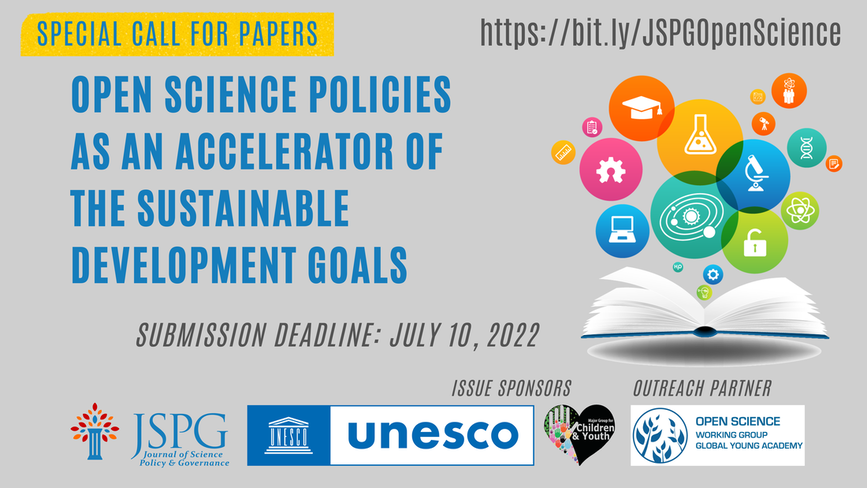Deadline: 10 July 2022
The Journal of Science Policy & Governance (JSPG), the UN Educational, Scientific and Cultural Organization (UNESCO) and the Major Group for Children and Youth (MGCY) are pleased to announce a call for papers and competition on shaping the future of global scientific practices in the light of the COVID-19 pandemic, focused on Open Science Policies as an Accelerator for Achieving the Sustainable Development Goals.
They invite students, post-doctoral researchers, policy fellows, early career researchers and young professionals from around the world to develop bold and innovative policy and governance ideas for exploring the untapped potential of open science to create a better society, and push for the attainment of the UN Agenda 2030 Sustainable Development Goals (SDGs).
Open science is a movement towards a more accessible, more transparent, and more participatory way of designing, conducting, publishing, and evaluating scholarly research. Open science can be a true game changer in bridging the science, technology and innovation gaps between and within countries, fulfilling the human right to science and leaving no one behind.
I. Submission Guidelines & Competition
- All article formats published by JSPG can be submitted to this Special Issue.
- Submissions will be reviewed by the JSPG editorial board.
- Accepted articles will undergo peer review by the JSPG editorial board.
- Following peer review, accepted articles will be entered into a policy paper competition, where a committee of experts in open science policies will select the top three articles.
- First, second and third place article winners will have the opportunity to present in UNESCO and MGCY events on open science.
- The criteria by which competition winners will be chosen can be found in this rubric.
- All published authors will be supported through strategic communications and interviewed for episodes of JSPG's podcast SciPol SoundBites and will be invited to participate in outreach events and opportunities organized by JSPG, UNESCO and MGCY once the issue is released.
II. Guiding Questions:
Below are a few guiding questions to help spur creative thinking among prospective authors. Authors may develop and submit policy papers covering any aspect of open science policy and the SDGs, but these questions will help provoke ideas.
- Capacity building and sustainable infrastructures: What policy opportunities are there for using open science to catalyze capacity building, and to enhance education and training? How can socio-political and cultural variations be accounted for in governance systems to maximize opportunities to build sustainable infrastructures for open science?
- Public participation and collaborative governance: What tools, resources and policies would need to be made available in order to help consolidate clearly delineated, transparent public participation channels in open science? How do communities engage in the processes of knowledge co-production and decision making? How do we ensure the participation of marginalized communities in policymaking and collaborative governance?
- Citizen science and decision-making: How can national state and non-state actors adapt governance systems to make them more attentive to citizen science inputs? What policies, skills, or tools are needed to facilitate the recognition of citizen science in decision-making?
- Culture development and evaluation: How do we create effective policy environments for open science? How do we align institutional and societal structures to facilitate this environment? How do we evaluate the outcomes of open science and their ability to facilitate culture change in the scientific community and beyond?
- Linking science to policy: What strategies or interventions would be necessary to help ensure that science advice in policymaking is itself informed by a more comprehensive, international perspective? What can policymakers do to translate global understandings of science into context-specific interventions?
- Science for all: How can policymakers consider science and science advice to support international developmental strategies? What strategies, tools or governance systems would be required to help guarantee salient scientific knowledge is widely available when necessary?
- Standard-setting for knowledge creation: What role does standard-setting have in recognizing different forms of knowledge and the methods by which they have been created? How can standards be challenged or upheld by stakeholders? What other effects do standards have on the scientific cycle, public participation and policymaking?
III. How to submit?
- Submit to JSPG using this form and view the submission guidelines rubric for specific criteria HERE : .
- For any questions regarding submissions please email Rosie Dutt at [email protected].
